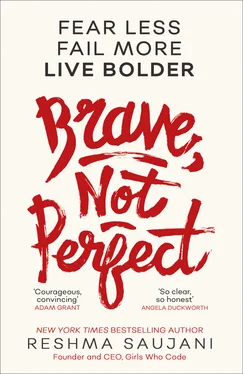“What’s fascinating is the extreme amount of work they put into everything, and how much they underestimate their performance,” she said. “I work with a lot of highly intelligent girls, and the quality of their writing is superior to what most adults can produce. But I constantly hear, ‘I couldn’t possibly turn that in.’ They write and rewrite five times. They’d rather ask for an extension than turn something in they think isn’t perfect.”
As soon as one paragraph or paper is polished to perfection, it’s on to the next. There’s no break in the cycle because it’s rare that their extreme efforts don’t pay off. “Perfection begets more perfection,” Meredith explained. “Every time a student overstudies or rewrites something five times and gets a good grade, it gets reinforced that she needs to do that again to succeed.”
For every girl who writes and rewrites her papers until she’s bleary-eyed, there’s a woman who reads (and rereads, and rereads . . .) an email, report, or even a simple birthday card before sending it to make sure it hits precisely the right note, or spends weeks planning the ideal dinner party or a family trip to make everyone happy, or changes her outfit six times before leaving the house. We revise, rework, and refine to get things just right, often to a point of obsession or frustration that takes us out of the game.
Whether I’m speaking at a private school in New York City or at a community center in Scranton, Pennsylvania, I ask the girls in the audience the same question: “How many of you strive to be perfect?” Almost without exception, 99 percent of the hands in the room shoot up. Not with embarrassment—with smiles. They know they’re trying to be perfect and are proud of it! They’re rewarded for that behavior so they see it as a virtue. We heap praise on our girls for getting good grades, being well behaved and well liked, and for being good listeners, polite, cooperative, and all the other qualities that earn them gold stars on their report cards. We tell them that they’re smart and talented, pretty and popular. They respond to these messages positively and wear them like a badge of honor. Is it any wonder that they see perfection as the only acceptable option?
In perfect-girl world, being judged harshly by their peers is the ultimate mortification; many girls and young women told me they won’t post pictures on social media that are anything short of perfectly posed and meticulously edited. They’ll take and retake a picture dozens of times to make sure it’s flattering. One seventeen-year-old who suffers from a mild case of scleroderma, an autoimmune disease that caused a small patch of hardened skin on her forehead, admitted that she will anxiously spend up to an hour trying to take the perfectly arranged selfie in which her “patch” is 100 percent concealed by her long bangs. To make matters even more agonizing, the new thing is to go in the complete opposite direction and post “no filter” photos, which becomes a whole other level of pressure to capture that selfie that’s “perfectly imperfect” without filters.
Girls will freely admit that they’re afraid to blemish their records, so they don’t take classes they aren’t certain they can get a high grade in—no matter how interested they are in the subject. This continues through college, as they automatically close doors to career paths they could potentially love. It’s not a coincidence that male economics majors outnumber women three to one; research done by Harvard economics professor Claudia Goldin revealed that women who earn B’s in introductory economics are far more likely to switch majors than those who earn A’s (while their male counterparts stick with it, B’s be damned).
Appearing stupid is a huge concern. In perfect-girl world, being judged harshly by one’s peers is the ultimate mortification; and it’s been shown to be one of the main barriers girls face when they think about doing anything brave. For Destiny, math had always been a challenge. But the boys in her middle school made her feel far worse about it. “I’d be up at the board for a long time trying to work out a problem, and they’d say something like, ‘You’re so dumb,’ or they’d laugh, and I’d get all flustered. It made me not even want to try to do math anymore. Why put all this effort in, just to get it wrong, and get yelled at by the boys?”
I know how she feels. When I was in law school at Yale, I remember sitting in my constitutional law class wanting desperately to contribute but feeling too intimidated. I mean, I was a girl from Schaumburg, Illinois, who was one of the first in my community to go on to an Ivy League grad school. All my classmates seemed so smart and impeccably articulate, and I didn’t want to seem stupid in comparison. So I’d write out in my notebook exactly what I wanted to say, then I’d rewrite it three, four, a dozen times. By the time I worked up the courage to raise my hand, class was usually over.
Of course, the fears of not measuring up extend beyond the classroom. Amanda wanted to try lacrosse in high school but didn’t because she’s “not athletic.” She summed up in two sentences a familiar sentiment I heard expressed in so many different varieties: “I just felt like if I couldn’t do it well, I didn’t want to do it at all.”
It’s important to understand that for girls, failure is defined as anything that is less than the proverbial A+. It’s black and white: you either totally rock or totally suck. To them, failure isn’t just painful—it’s colossal, devastating, and to be avoided at all costs. So if they can’t rock it, they skip it.
When Amanda declared that she didn’t dare try lacrosse, she fell victim to a type of thinking that Stanford psychologist Carol Dweck famously outlined in her brilliant book Mindset . In a nutshell, Dweck identified two different belief systems about ability and intelligence.
The first is a fixed mindset . A person with a fixed mind-set believes that their abilities are innate and unchangeable. You’re either smart or you aren’t, talented or untalented, athletic or not at all, and there’s not much you can do about it. The other is a growth mindset , which is based on the belief that abilities can be developed and cultivated through effort. Regardless of whatever natural level of ability or talent you are born with, you can learn skills and improve.
These are the hallmarks of a fixed mindset:
• An urgency to prove oneself again and again.
• Deep concern about making mistakes and failing.
• A reluctance to expose deficiencies.
• Seeing imperfections as shameful.
• The expectation that one will do well on something right away and if one doesn’t, the loss of interest or self-admonishment for having put in the effort.
• The tendency to see failures as a measure of one’s worth and allowing those failures to define the person.
• Being solely focused on the outcomes. It doesn’t matter what one achieved or learned along the way. Not hitting the final mark means failure. And failure means that one isn’t smart, talented, or good enough.
Sound familiar?
When you tell someone with a fixed mindset that they are smart or talented, they etch these messages into the “this is how I am” truth in their minds. That sounds like good, positive self-esteem building, but the problem is that after being showered with such praise of their perceived innate abilities, they fall to pieces when they encounter setbacks. Why? Because they take any failure, however insignificant, as a sign that maybe they aren’t as innately smart or talented as they thought.
A fixed mindset also holds us back from trying anything outside our comfort zone. How many times have you begged off doing something spontaneous and potentially fun with, “I’m just not adventurous,” or turned down an invitation or opportunity because “that’s just not who I am”? That’s the fixed mindset at work.
Читать дальше












